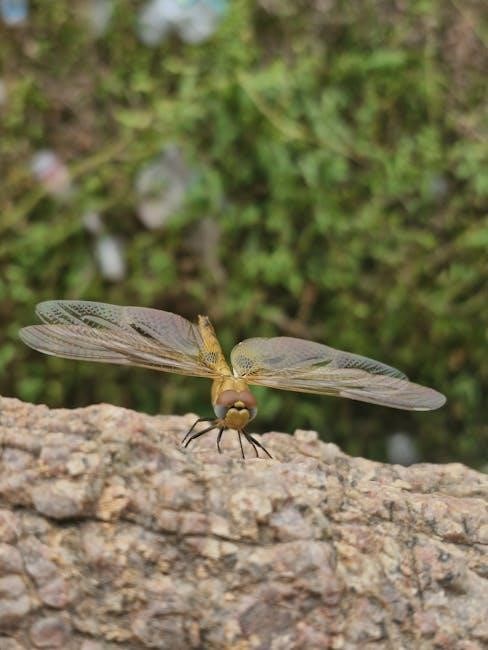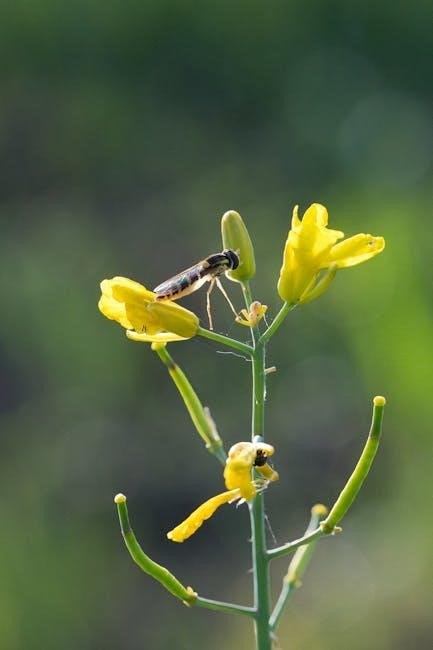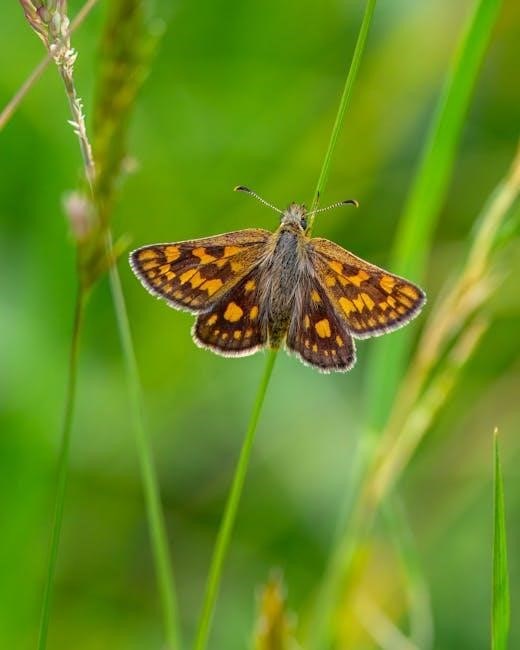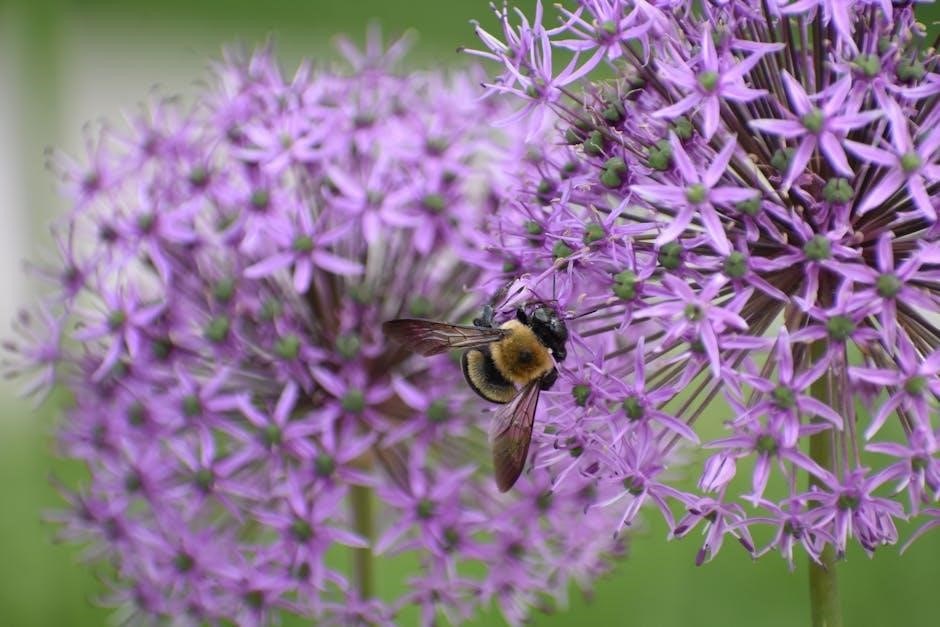Wildlife biology combines ecology‚ zoology‚ and conservation to study and manage wildlife. College prerequisites include strong foundational courses in biology‚ chemistry‚ mathematics‚ and often physics‚ ensuring preparedness for rigorous academic programs.
1.1 Overview of Wildlife Biology as a Field of Study
Wildlife biology is an interdisciplinary field studying interactions between wildlife and their environments. It integrates ecology‚ zoology‚ genetics‚ and conservation to understand and manage wild animal populations. The discipline focuses on preserving biodiversity‚ addressing human-wildlife conflicts‚ and promoting sustainable ecosystems. By combining scientific research with practical applications‚ wildlife biologists contribute to habitat restoration‚ species conservation‚ and environmental policy development. This field is essential for addressing global challenges like climate change and human-induced habitat loss.
1.2 Importance of Meeting College Prerequisites
Fulfilling college prerequisites ensures a solid academic foundation for wildlife biology programs. These courses‚ including biology‚ chemistry‚ and mathematics‚ provide essential skills for understanding complex ecological principles and conducting research. Meeting prerequisites demonstrates commitment and readiness‚ enhancing competitiveness in admissions and future career opportunities. They also prepare students for advanced coursework and fieldwork‚ crucial for success in wildlife management and conservation careers.

General Education Requirements
General education requirements for wildlife biology include high school courses in biology‚ chemistry‚ and mathematics‚ along with maintaining a competitive GPA and satisfactory standardized test scores.
2.1 High School Course Recommendations
High school students aspiring to study wildlife biology should focus on courses in biology‚ chemistry‚ and mathematics. Advanced Placement (AP) or honors classes in environmental science‚ ecology‚ or zoology are beneficial. Additionally‚ courses in physics and statistics can provide a strong foundation for college-level work. Extracurricular activities‚ such as volunteering for wildlife conservation projects or participating in science fairs‚ can also enhance preparation and demonstrate commitment to the field. A strong academic record in these areas is essential for meeting college prerequisites.
2.2 Minimum GPA Requirements
Colleges often require a minimum GPA for admission to wildlife biology programs‚ typically ranging from 2.5 to 3.0 or higher. A strong academic record‚ particularly in science and mathematics courses‚ is crucial for competitive admission. Some programs may require a higher GPA for direct entry or for scholarships. Maintaining a high GPA during high school demonstrates readiness for the rigorous coursework in biology‚ chemistry‚ and related fields. A minimum GPA ensures students are well-prepared for the academic demands of a wildlife biology degree.
2.3 Standardized Test Scores (SAT/ACT)
Standardized test scores‚ such as the SAT or ACT‚ are often required for admission to wildlife biology programs. Many universities require SAT scores in the range of 1‚000 to 1‚300 or ACT scores between 18 and 28. However‚ some institutions are test-optional‚ allowing applicants to choose whether to submit scores. Competitive programs may expect higher scores‚ particularly in math and science sections. These scores‚ along with GPA and coursework‚ are used to assess a student’s readiness for college-level studies in wildlife biology and related sciences.
Core Science Courses
Core science courses include biology‚ chemistry‚ mathematics‚ and physics‚ providing a strong foundation for understanding ecological principles and wildlife management techniques.
3.1 Biology Requirements
Students pursuing a wildlife biology major must complete foundational biology courses‚ including genetics‚ ecology‚ and evolutionary biology. These courses provide essential knowledge of biological principles and processes. Genetics (3 credits) covers gene transmission and molecular mechanisms‚ while Ecology (4 credits) explores interactions between organisms and their environments. Additional courses may include botany‚ zoology‚ and cell biology. Laboratories and fieldwork are often required to enhance practical skills. These courses lay the groundwork for advanced studies in wildlife conservation and management.
3.2 Chemistry Requirements
Chemistry is a cornerstone of wildlife biology‚ with courses like General Chemistry I and II being essential. These courses cover foundational concepts such as chemical bonding‚ thermodynamics‚ and molecular structures. Organic Chemistry is also often required‚ focusing on carbon-based compounds and their reactions. Additionally‚ some programs may include Biochemistry to explore the chemical processes in living organisms. Labs accompany these courses‚ providing hands-on experience with chemical analyses and techniques. These skills are vital for understanding ecological interactions‚ toxicology‚ and conservation chemistry in wildlife management and research.
3.3 Mathematics Requirements
Mathematics is essential for wildlife biology‚ with courses like College Algebra and Calculus I and II often required. These courses build skills in algebraic manipulation‚ calculus concepts‚ and quantitative reasoning. Statistics is also crucial‚ as it is used for data analysis in ecological studies and research. Proficiency in mathematics enables students to model population dynamics‚ understand habitat analysis‚ and interpret scientific data effectively. Strong math skills are vital for conducting research and applying analytical techniques in wildlife management and conservation biology.
3.4 Physics Requirements
Physics is fundamental to understanding biological systems and ecological processes. Courses like College Physics I and II are typically required‚ covering mechanics‚ thermodynamics‚ and energy principles. These concepts apply to ecosystem dynamics‚ animal movement‚ and environmental measurements. Proficiency in physics enhances analytical and problem-solving skills‚ crucial for wildlife biology. While not always emphasized‚ physics provides a foundational understanding of natural laws governing living systems‚ aiding in advanced studies and practical applications in the field. Requirements may vary by institution but are essential for a comprehensive scientific education.
Wildlife Biology Major-Specific Courses
Major-specific courses include introductory wildlife biology‚ ecology‚ zoology‚ and GIS‚ providing foundational knowledge and practical skills in wildlife management‚ conservation‚ and ecological principles.
4.1 Introductory Wildlife Biology Courses
Introductory courses in wildlife biology provide foundational knowledge of ecological principles‚ conservation biology‚ and wildlife management. These courses explore biodiversity‚ ecosystem dynamics‚ and human impacts on wildlife populations. Students learn basic field methods‚ data collection techniques‚ and analytical skills essential for understanding wildlife behavior and habitats. These courses set the stage for advanced studies‚ offering a broad understanding of the field and preparing students for specialized topics in ecology‚ zoology‚ and conservation biology.
4.2 Ecology and Conservation Biology
Ecology and conservation biology courses delve into the study of ecosystems‚ species interactions‚ and biodiversity preservation. These courses emphasize theoretical and practical approaches to understanding ecological principles‚ threats to wildlife‚ and strategies for conservation. Topics include population dynamics‚ habitat restoration‚ and human-wildlife conflict resolution. Students gain insights into applied conservation practices‚ preparing them to address real-world environmental challenges and develop sustainable solutions for protecting ecosystems and endangered species.
4.3 Zoology and Animal Behavior
Zoology and animal behavior courses explore the diversity of wildlife‚ focusing on species-specific traits‚ behaviors‚ and adaptations. These courses cover topics like ethology‚ behavioral ecology‚ and wildlife physiology‚ providing insights into how animals interact with their environments. Practical applications include field observations and lab studies‚ equipping students with skills to analyze and interpret animal behaviors. This knowledge is crucial for understanding ecological roles and developing effective conservation strategies‚ preparing students for careers in wildlife management and research.
4.4 Geographic Information Systems (GIS)
Geographic Information Systems (GIS) courses teach spatial analysis and mapping technologies essential for wildlife management. Students learn to use GIS tools for habitat analysis‚ species distribution mapping‚ and landscape planning. These skills are critical for conservation efforts‚ enabling precise data-driven decisions. Practical applications include tracking wildlife movements and managing ecosystems effectively. GIS proficiency enhances career opportunities in wildlife biology‚ equipping students with advanced spatial reasoning and data visualization capabilities.

Additional Requirements
Field experience‚ internships‚ and research projects enhance practical skills and employability. Certifications like those from The Wildlife Society can also strengthen a student’s credentials in wildlife biology.
5.1 Field Experience and Internships
Field experience and internships are crucial for gaining hands-on skills in wildlife biology. These opportunities allow students to apply theoretical knowledge in real-world settings‚ such as monitoring wildlife populations‚ conducting ecological surveys‚ or assisting in conservation projects. Many programs require or strongly recommend internships to prepare students for professional roles. Working alongside experienced biologists and researchers provides valuable insights and practical training‚ enhancing resumes and career prospects in wildlife management and conservation.
- Provides practical exposure to field techniques and tools.
- Helps build professional networks and industry connections.
- Enhances understanding of ecological challenges and solutions.
5.2 Research Projects and Senior Thesis
Research projects and senior theses are essential components of a wildlife biology program‚ fostering critical thinking and scientific inquiry. Students engage in independent or faculty-guided research‚ often involving fieldwork‚ data collection‚ and statistical analysis. These projects allow students to explore specific interests‚ such as conservation biology or animal behavior‚ while developing advanced research skills. The senior thesis demonstrates a student’s ability to synthesize knowledge and contribute to the field‚ preparing them for graduate studies or professional roles in wildlife management and research.
- Encourages original contributions to wildlife biology.
- Strengthens analytical and problem-solving abilities.
- Prepares students for academic or professional advancement.
5.3 Certification Opportunities
Certification opportunities in wildlife biology enhance professional credibility and career prospects. The Wildlife Society offers certifications such as the Associate Wildlife Biologist (AWB) and Certified Wildlife Biologist (CWB) designations. These require specific coursework‚ practical experience‚ and adherence to ethical standards. Certifications demonstrate expertise in conservation‚ ecology‚ and wildlife management‚ making graduates more competitive in the job market. Many programs align with these certification requirements‚ ensuring students are well-prepared to pursue these credentials upon graduation.
- Recognizes proficiency in wildlife biology principles.
- Supports career advancement in conservation roles.
- Encourages ongoing professional development.

Elective and Specialized Courses
Electives like advanced vertebrate biology‚ wildlife management‚ and environmental science provide specialized knowledge. Courses in GIS and conservation biology further enhance skills‚ preparing students for diverse careers.
6.1 Advanced Vertebrate Electives
Advanced vertebrate electives delve into specialized topics such as mammalogy‚ ornithology‚ and herpetology. These courses provide in-depth study of specific animal groups‚ focusing on their physiology‚ behavior‚ and ecological roles. Students explore evolutionary adaptations‚ conservation challenges‚ and management strategies. Practical labs and fieldwork enhance theoretical knowledge‚ preparing graduates for careers in wildlife research‚ conservation‚ and management. These electives are crucial for developing expertise in vertebrate biology‚ aligning with professional certification requirements in wildlife biology.
6.2 Wildlife Management and Policy
Wildlife management and policy courses focus on strategies for managing wildlife populations and habitats. Students learn to integrate ecological principles with policy frameworks‚ addressing human-wildlife conflicts and conservation planning. These courses cover legal and regulatory aspects‚ such as endangered species laws and land-use policies. Practical applications include developing sustainable practices and balancing human needs with wildlife conservation; This specialization prepares graduates for roles in government agencies‚ NGOs‚ and private sectors‚ emphasizing the importance of policy in effective wildlife management and biodiversity preservation.
6.3 Environmental Science and Sustainability
Environmental science and sustainability courses explore the interconnectedness of ecosystems and human activities. Students learn to address environmental challenges‚ such as climate change and habitat degradation‚ through sustainable practices. These courses emphasize the importance of balancing human needs with ecological preservation‚ preparing students to develop innovative solutions for conservation. Fieldwork and case studies often highlight real-world applications‚ equipping future wildlife biologists with tools to promote biodiversity and sustainable land management in diverse ecosystems.
University-Specific Requirements
Universities like UNH require specific courses and credits for wildlife biology programs‚ ensuring students meet rigorous academic standards tailored to their institution’s curriculum and research focus.
7.1 University of New Hampshire (UNH) Wildlife Biology Program
The University of New Hampshire’s Wildlife and Conservation Biology program offers a comprehensive curriculum with a focus on field research and conservation planning. Located in a wildlife-rich region‚ students gain hands-on experience through intensive lab and fieldwork. The program emphasizes biodiversity conservation‚ ecosystem management‚ and human-wildlife interactions. Courses include ecology‚ genetics‚ and GIS‚ preparing students for careers in wildlife management and research. UNH’s program is renowned for its interdisciplinary approach and faculty expertise in areas like big game management and conservation genetics.
7.2 Other Notable Universities Offering Wildlife Biology Majors
Other prominent universities offering wildlife biology majors include the University of Wyoming‚ known for its focus on environmental problem-solving‚ and the University of Guelph in Canada‚ which provides a unique program emphasizing biodiversity conservation. Utah State University also stands out with its dedicated College of Natural Resources‚ offering specialized courses in wildlife ecology and management. These programs often include fieldwork‚ research opportunities‚ and interdisciplinary approaches‚ preparing students for careers in conservation and wildlife management.
Skills and Knowledge Gained
Students gain practical wildlife management skills‚ data analysis expertise‚ and a deep understanding of conservation principles‚ preparing them for careers in ecology‚ research‚ and environmental stewardship.
8.1 Practical Skills in Wildlife Management
Students develop hands-on experience in field research‚ data collection‚ and habitat analysis. They learn species identification‚ population monitoring‚ and conservation techniques. Practical skills include using GIS tools‚ remote sensing‚ and field equipment. These skills prepare graduates to manage wildlife populations‚ assess ecosystems‚ and implement effective conservation strategies in real-world scenarios.
8.2 Data Analysis and Statistical Knowledge
Wildlife biology programs emphasize statistical analysis and data interpretation‚ essential for research and conservation. Students learn to apply software tools like R and GIS to analyze ecological data‚ model population dynamics‚ and assess conservation impacts. Understanding statistical principles enables graduates to design experiments‚ interpret results‚ and inform evidence-based management decisions‚ crucial for addressing environmental challenges effectively.
8.3 Conservation and Ecological Principles
Wildlife biology programs emphasize conservation and ecological principles‚ teaching students to understand ecosystems‚ biodiversity‚ and human impacts. Courses cover population dynamics‚ habitat management‚ and strategies to mitigate threats like climate change. Practical training in field research and conservation planning prepares students to address real-world environmental challenges‚ ensuring the preservation of species and ecosystems for future generations.
Preparation for Graduate School
Wildlife biology programs often prepare students for graduate studies in ecology‚ conservation biology‚ or zoology. Research experience and advanced coursework are key for strong graduate applications.
9.1 Graduate Program Options in Wildlife Biology
Graduate programs in wildlife biology offer specialized fields like mammalogy‚ ornithology‚ herpetology‚ and conservation biology. These programs often focus on advanced research in ecology‚ genetics‚ and animal behavior. Many universities provide interdisciplinary approaches‚ combining coursework with hands-on field experience. Students can pursue Master’s or Ph.D. degrees‚ preparing for careers in academia‚ research‚ or advanced conservation roles. Faculty expertise and cutting-edge facilities enhance learning‚ ensuring students are well-equipped for future challenges in wildlife science and management.
9.2 Importance of Undergraduate Research
Engaging in undergraduate research is crucial for gaining hands-on experience and developing critical thinking skills. It provides opportunities to work on faculty-led projects‚ such as studying wildlife habitats or conservation genetics. This experience enhances resumes‚ strengthens graduate school applications‚ and prepares students for advanced research. Many programs require a senior thesis or project‚ fostering original inquiry and problem-solving abilities. Undergraduate research not only deepens academic understanding but also builds practical skills essential for careers in wildlife biology and related fields.

Career Opportunities and Pathways
Wildlife biology graduates can pursue roles as wildlife biologists‚ conservationists‚ ecologists‚ and environmental scientists. Careers span government agencies‚ NGOs‚ and private sectors‚ with opportunities in research‚ policy‚ and education. Specializations like wildlife management and sustainability are in demand‚ offering diverse pathways for professionals passionate about environmental stewardship and species preservation.
10.1 Wildlife Biologist Roles and Responsibilities
Wildlife biologists study and manage animal populations‚ habitats‚ and ecosystems. Their roles include conducting field research‚ developing conservation plans‚ and collaborating with agencies to implement wildlife management strategies. They analyze data to understand species behavior‚ population dynamics‚ and environmental impacts. Additionally‚ wildlife biologists often work with policymakers to advocate for conservation efforts and educate the public about wildlife preservation. Their responsibilities span both fieldwork and office tasks‚ requiring strong analytical‚ communication‚ and problem-solving skills to address environmental challenges effectively.
10.2 Job Market and Salary Expectations
The job market for wildlife biologists is competitive‚ with roles in government agencies‚ NGOs‚ and private sectors. Entry-level positions often start with salaries ranging from $40‚000 to $60‚000 annually. Experienced professionals in senior roles or specialized fields can earn upwards of $80‚000 to $100‚000. Salary expectations vary based on location‚ employer‚ and specific responsibilities. Growth opportunities exist for those with advanced degrees or certifications‚ making continued education and professional development valuable for career advancement in this field.
10.3 Professional Certifications in Wildlife Biology
Professional certifications‚ such as those offered by The Wildlife Society‚ enhance credibility and career opportunities. The Certified Wildlife Biologist (CWB) and Associate Certified Wildlife Biologist (ACWB) designations require specific education‚ experience‚ and passing an exam. These certifications demonstrate expertise in wildlife management‚ conservation‚ and ecological principles. They are particularly beneficial for roles in government agencies‚ NGOs‚ and private sectors‚ offering a competitive edge in the job market and advancing professional growth in the field of wildlife biology.

Admissions Process and Tips
A strong GPA‚ relevant coursework‚ and a compelling personal statement are crucial. Secure letters of recommendation and meet application deadlines to ensure a competitive application.
11.1 Application Deadlines and Requirements
Admissions for wildlife biology programs typically require submission of transcripts‚ SAT/ACT scores‚ and letters of recommendation. Deadlines vary by institution but often fall between January and March for fall enrollment. A minimum GPA of 2.5 to 3.0 is commonly required‚ along with completion of prerequisite courses in biology‚ chemistry‚ and mathematics. Some programs may also require a personal statement or interview. Ensure all materials are submitted on time to avoid delays in processing your application.
11.2 Writing a Strong Personal Statement
A compelling personal statement for wildlife biology programs should highlight your passion for conservation‚ outdoor experiences‚ and academic preparation. Discuss relevant coursework‚ fieldwork‚ or volunteer experiences that demonstrate your commitment to the field. Emphasize skills such as data analysis‚ GIS proficiency‚ or animal behavior observation. Clearly articulate your career goals and how the program aligns with your aspirations. Showcase your unique perspective and dedication to making a positive impact on wildlife and ecosystems‚ ensuring your statement reflects both personal and professional motivations.
11.3 Securing Letters of Recommendation
To strengthen your application‚ request letters of recommendation from professors‚ mentors‚ or supervisors who can speak to your academic abilities‚ fieldwork experience‚ and passion for wildlife biology. Provide them with your resume‚ personal statement‚ and program details to help them craft tailored‚ insightful letters. Ensure recommenders have ample time to submit their letters‚ ideally 2-3 months before deadlines. Strong letters highlight your suitability for the program and alignment with its focus on conservation and ecological principles.
Pursuing a wildlife biology major requires meeting specific prerequisites‚ including foundational sciences and field experiences. Dedication to these requirements prepares students for impactful careers in conservation and ecological management.
12.1 Summary of Key Prerequisites
Key prerequisites for a wildlife biology major include foundational courses in biology‚ chemistry‚ mathematics‚ and often physics. Additionally‚ high school preparation should focus on advanced science and math courses. A minimum GPA and standardized test scores are typically required for admission. Many programs also emphasize the importance of field experience and research projects‚ which enhance practical skills and knowledge. Meeting these prerequisites ensures a strong academic foundation for success in the program.
12.2 Final Tips for Prospective Students
Prospective students should research programs thoroughly‚ ensuring they align with career goals. Gaining practical experience through internships or volunteering is crucial. Building a strong academic record and meeting all prerequisites will enhance admission chances. Seeking mentorship from professors and professionals can provide valuable insights. Finally‚ staying passionate about conservation and wildlife will drive success in this rewarding field.